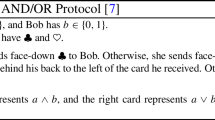Abstract
Consider an election where there are two candidates and several voters. Such an election usually requires the same number of ballot papers as the number of voters. In this paper, we show that such an election can be conducted using only a logarithmic number of cards with two suits—black and red—with identical backs. That is, we can securely compute the summation of a number of inputs (0s and 1s) using a logarithmic number of cards with respect to the number of inputs.
Access this chapter
Tax calculation will be finalised at checkout
Purchases are for personal use only
Preview
Unable to display preview. Download preview PDF.
Similar content being viewed by others
References
Balogh, J., Csirik, J.A., Ishai, Y., Kushilevitz, E.: Private computation using a PEZ dispenser. Theoretical Computer Science 306, 69–84 (2003)
den Boer, B.: More efficient match-making and satisfiability: the five card trick. In: Quisquater, J.-J., Vandewalle, J. (eds.) EUROCRYPT 1989. LNCS, vol. 434, pp. 208–217. Springer, Heidelberg (1990)
Fagin, R., Naor, M., Winkler, P.: Comparing information without leaking it. Communications of the ACM 39(5), 77–85 (1996)
Crépeau, C., Kilian, J.: Discreet solitary games. In: Stinson, D.R. (ed.) CRYPTO 1993. LNCS, vol. 773, pp. 319–330. Springer, Heidelberg (1994)
Goldreich, O.: Foundations of Cryptography II: Basic Applications. Cambridge University Press, Cambridge (2004)
Mizuki, T., Sone, H.: Six-card secure AND and four-card secure XOR. In: Deng, X., Hopcroft, J.E., Xue, J. (eds.) FAW 2009. LNCS, vol. 5598, pp. 358–369. Springer, Heidelberg (2009)
Mizuki, T., Kumamoto, M., Sone, H.: The five-card trick can be done with four cards. In: Wang, X., Sako, K. (eds.) ASIACRYPT 2012. LNCS, vol. 7658, pp. 598–606. Springer, Heidelberg (2012)
Mizuki, T., Uchiike, F., Sone, H.: Securely computing XOR with 10 cards. Australasian Journal of Combinatorics 36, 279–293 (2006)
Moran, T., Naor, M.: Polling with physical envelopes: A rigorous analysis of a human-centric protocol. In: Vaudenay, S. (ed.) EUROCRYPT 2006. LNCS, vol. 4004, pp. 88–108. Springer, Heidelberg (2006)
Niemi, V., Renvall, A.: Secure multiparty computations without computers. Theoretical Computer Science 191, 173–183 (1998)
Schneider, T.: Engineering Secure Two-Party Computation Protocols. Springer, Heidelberg (2012)
Stiglic, A.: Computations with a deck of cards. Theoretical Computer Science 259, 671–678 (2001)
Yao, A.: Protocols for secure computations. In: Proceedings of the 23th IEEE Symposium on Foundations of Computer Science, FOCS 1982, pp. 160–164 (1982)
Author information
Authors and Affiliations
Editor information
Editors and Affiliations
Rights and permissions
Copyright information
© 2013 Springer-Verlag Berlin Heidelberg
About this paper
Cite this paper
Mizuki, T., Asiedu, I.K., Sone, H. (2013). Voting with a Logarithmic Number of Cards. In: Mauri, G., Dennunzio, A., Manzoni, L., Porreca, A.E. (eds) Unconventional Computation and Natural Computation. UCNC 2013. Lecture Notes in Computer Science, vol 7956. Springer, Berlin, Heidelberg. https://doi.org/10.1007/978-3-642-39074-6_16
Download citation
DOI: https://doi.org/10.1007/978-3-642-39074-6_16
Publisher Name: Springer, Berlin, Heidelberg
Print ISBN: 978-3-642-39073-9
Online ISBN: 978-3-642-39074-6
eBook Packages: Computer ScienceComputer Science (R0)





